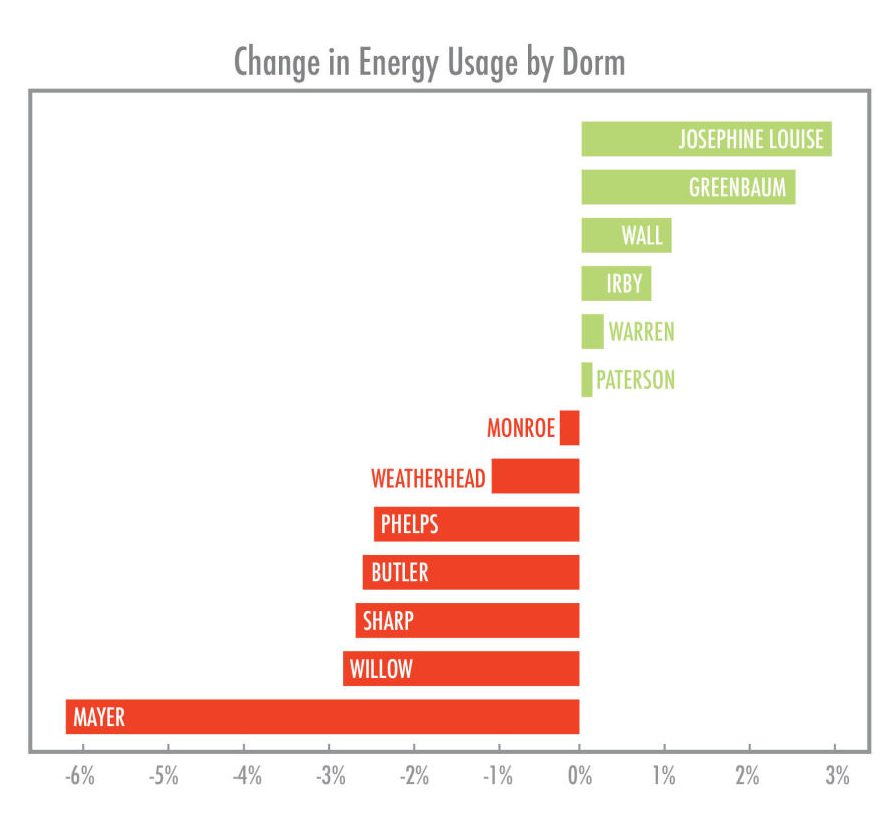Students speak for energy conservation through Unplugged
The students involved in the Tulane Unplugged energy conservation campaign want more than to inspire competition between residence halls–they aim to raise awareness about individual actions that impact global threats like climate change.
Student volunteers called Energy Advocates, along with staff and student interns with Tulane’s Office of Sustainability, hosted the second competition educating and encouraging on-campus residents to reduce their electricity usage during the campaign, which lasted from Oct. 31 to Nov. 13. Josephine Louise House won the competition by reducing its energy consumption by 2.8 percent over a two-week baseline period, more than any other residential hall.
“The biggest piece in the competition is getting the Energy Advocates to participate with their dorms and raise awareness on energy use and how that impacts climate,” Assistant Director of Tulane’s Office of Sustainability Liz Pfafflin said.
Energy Advocates were selected to coordinate outreach to peers about the individual actions they can take to reduce their own energy consumption. These students took a creative approach to environmental issues in their chosen methods of outreach to peers.
“One of our advocates came up with a sticker design, and we passed that out at tabling,” Pfafflin said. “Another girl reached out to people by having a mini plant set up at her table…a lima bean in a cup with a wet paper towel…and [that] was how she got people to come over and talk to her about the competition.”
Freshman Isabel Froemming, an Energy Advocate in the competition, said that she started conversations in the dining hall or in passing in her dorm to spread information about the competition, along with Facebook posts to send updates on her dorm’s progress and areas for improvement. She also introduced the incentive of a free, dorm-wide breakfast to inspire further action.
“I was honestly surprised to see how well my dorm was doing in comparison to other halls on campus halfway through the competition,” Froemming said. “It shows the importance of communication and how small efforts can make a huge difference when you rally behind a cause that most people can agree is good for the community. Having a moral tie to the project made it an impactful experience for me.”
Organizers stressed individual actions like turning off lights when they are unneeded. Student volunteers tabling in front of dorm buildings handed out paper “pledges” on which other students listed specific actions they would take to reduce their personal energy consumption.
Despite these successes, most involved in the competition would say that more work still needs to be done at the university level.
“Countless Wall residents don’t know about the recycling room on the first floor,” said freshman Energy Advocate Eva Dils. “Out of the hundreds of students living in Monroe, zero applied for the Energy Advocate position. For me, this Unplugged competition is a clear indicator that though steps have been taken…there is more work to be done.”
Some feel one of the biggest problems with working to prevent climate change is the lack of information and awareness many students have on the matter.
“People just don’t know how their life implicates climate change… for example, that half of our energy in the Tulane community comes from the lights in the building,” said senior Elias Garcia, an intern at the Office of Sustainability. “A large part of sustainability issues is not the product you get at the end but how you affect cultural change.”
The Tulane Unplugged challenge to reduce energy consumption was the Office of Sustainability’s main project for the fall semester. In the spring, sustainability efforts will focus on recycling and waste reduction as an important environmental sustainability issue.
“Individual action is a bridge to understanding how the larger culture can address it as well,” said Garcia. “This is one of a million steps that need to be taken, but this [competition] is one way that we can engage people to think about that.”
Your donation will support the student journalists of Tulane University. Your contribution will allow us to purchase equipment and cover our annual website hosting costs.





Leave a Comment